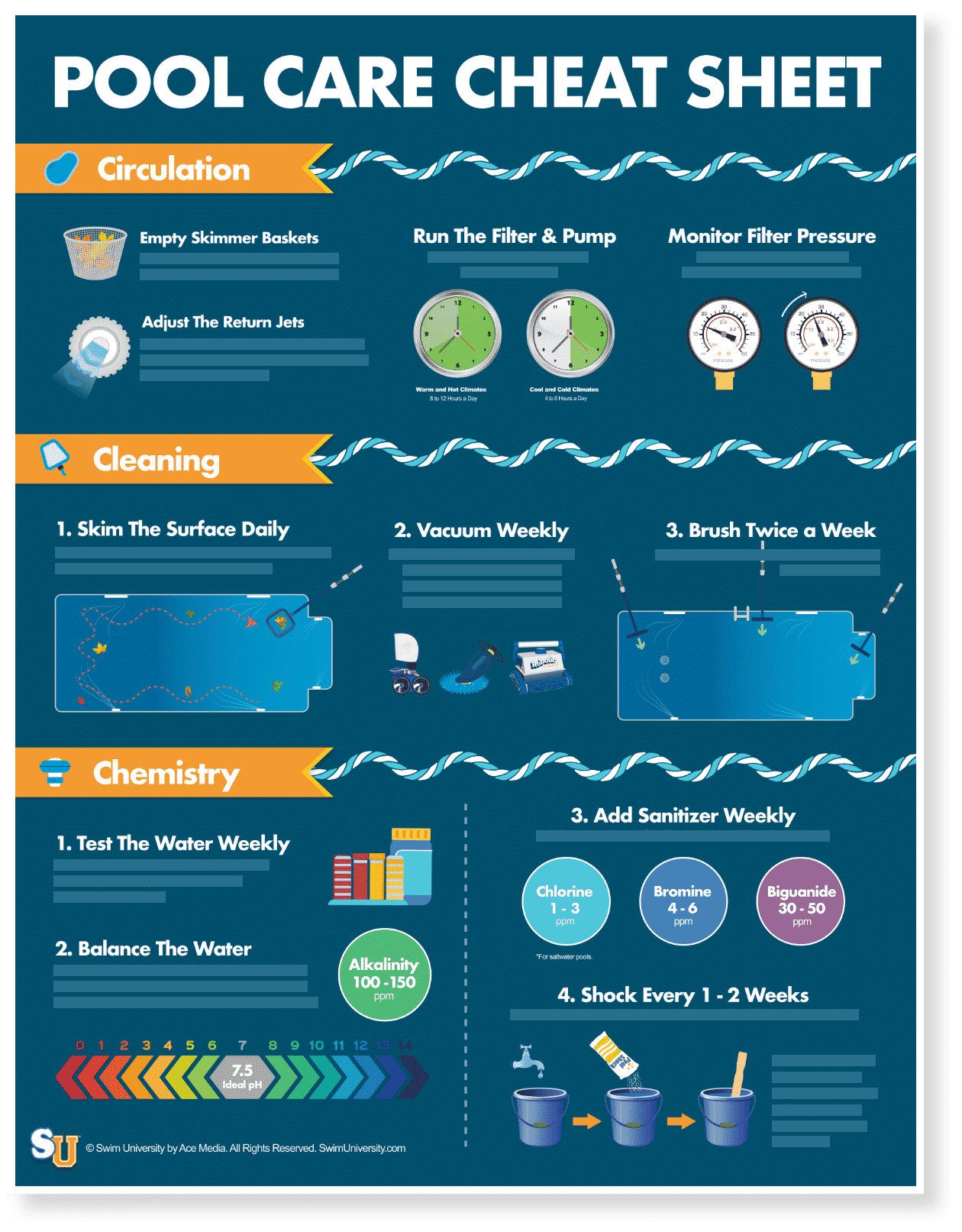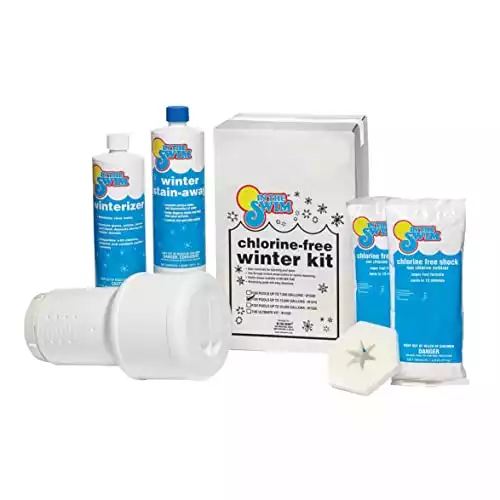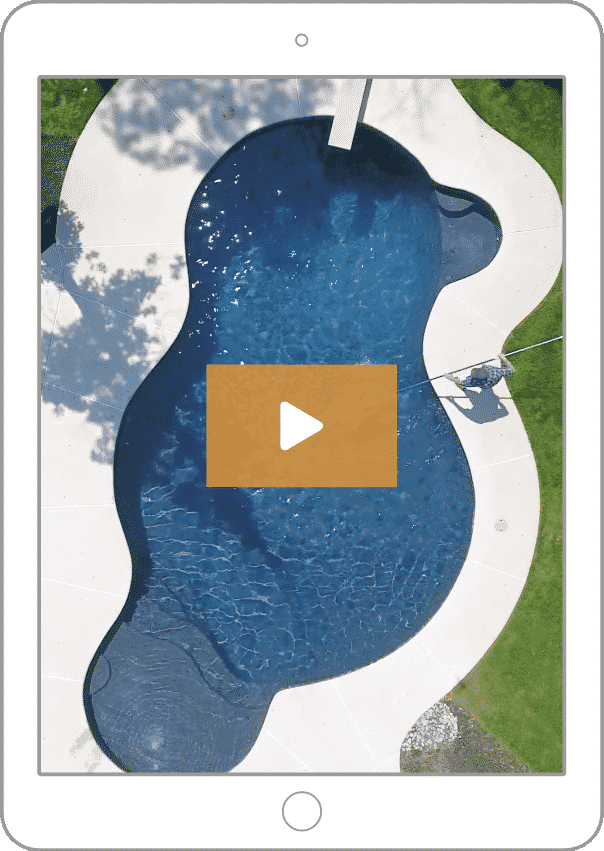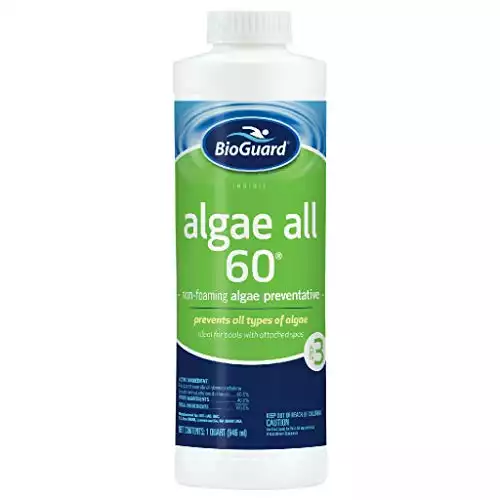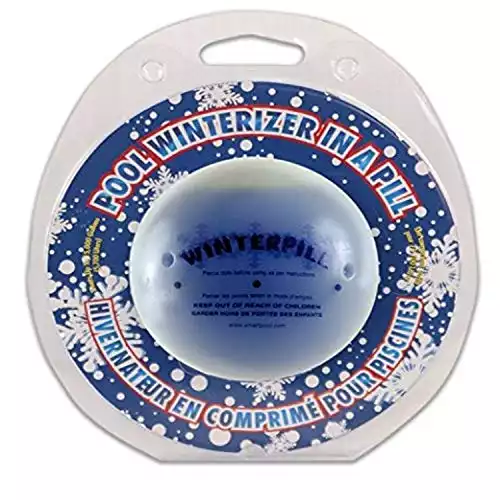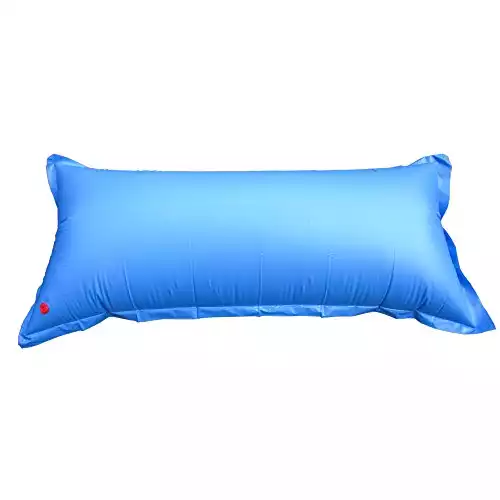Do you actually need a pool closing kit? And are they worth it? Winter pool closing kits usually come with everything you need to keep your pool protected and algae-free in the off-season, including:
- Algaecide
- Enzymes
- Scale and Stain Prevention
- Non-Chlorine Shock
- Other Pool Supplies, like Air Pillows and Time-Release Floaters
This winterizing and closing chemical kit is designed to save you time and money by including all the necessary chemicals to close your pool. This kit includes winter algaecide, stain prevention, chlorine-free shock, an absorbing sponge, and a pool floater.
These kits are a convenient, all-in-one package to keep your pool clean in the off-season and help pool opening go smoothly in the spring. But you might not necessarily need all of the chemicals inside. So before you buy a kit, here’s a breakdown of what it comes with, which chemicals you actually need to close your pool, and which products you don’t. Watch the quick video below or keep reading for the complete pool winterizing kit guide.
How to Prepare Your Pool for Closing
First, whether or not you decide to buy a winter closing kit, you’ll need to do a few things to prepare your pool before adding any winterizing chemicals. And keep in mind that you might need to lower your pool water level below the skimmer, depending on how you plan to winterize your plumbing or what kind of cover you have.
So give yourself a week to complete all of your pool closing tasks, especially if you plan to use chlorine shock. A little extra work now will save you from any pool-opening headaches and algae growth issues in the spring.
1. Skim, brush and vacuum your pool
Anything you leave floating in your water or clinging to your walls will just get worse over the winter, so give your pool one last clean before closing up.
2. Test and balance your water
The goal is to get your water as balanced and healthy as possible before closing. So test your water and adjust your pool chemical levels as you would normally. Pay extra attention to pH, alkalinity, and calcium hardness. Your pH and alkalinity levels will help your other chemicals do their job over the winter. And imbalanced calcium hardness levels can damage your pool surfaces or equipment.
By the way, if you feel confused about when and how to add chemicals, check out our Pool Care Video Course.
Frustrated by adding chemicals and trying to keep your pool clear all the time?
We cut out all the confusion of pool maintenance in this easy-to-read illustrated ebook and video course. It'll help you save $100 right away on pool care!
Click Here to Learn More3. Shock your pool with chlorine
Shocking your water will kill any lingering contaminants, especially algae. A cal-hypo shock is the most powerful chlorine shock treatment, but you’ll need to add it at night and wait at least 8 hours to let it circulate and dissolve. If you want to speed things up, you can use a fast-dissolving chlorine shock, like dichlor shock, or liquid chlorine to shock your water. Just watch your cyanuric acid levels if you use a dichlor shock. Then retest your water and wait until your chlorine levels have dropped back down to add more chemicals.
Pool Closing Kits: Which Chemicals Do You Need to Close Your Pool?
Now that you’ve prepped your pool, it’s time to talk about winterizing chemicals. Here’s what’s in a typical pool closing kit and here’s which of the chemicals and pool supplies you actually need:
1. Winter Algaecide
Adding an algaecide before covering your pool is a great way to prevent green water in the spring. This is especially important if temperatures reach 60°F while you still have your pool cover on. While most kits market their algaecide as a “winter” formula, you might already have the right kind of algaecide on hand. Look for a 60% Polyquat Algaecide. This is non-copper based with a powerful enough concentration to kill algae in the off-season. It’s more expensive than a copper-based algaecide, but it won’t stain. And it won’t foam.
A copper-free algaecide to help prevent your pool from turning green.
2. Slow-Release Winter Ball or Winter Pill
A Winterizer Ball or Pill slowly releases a blend of enzymes, clarifier, and stain and scale prevention into your water during the off-season. And it won’t affect the rest of your water chemistry. So if you have water with high metal content or if you struggle with stains, scaling, or scum lines in the spring, this product can help. And it’s a convenient, easy-to-use alternative to buying enzymes, clarifiers, and stain remover separately. But this is optional, so it’s considered extra insurance for some pool owners.
This 4-in-1, slow-release treatment floats under your winter cover all season to help prevent scum, scale, stains, and cloudy water. Safe for all surfaces and filters.
3. Stain and Scale Preventer
In addition to an all-in-one Winter Pill, many pool closing kits come with a separate chemical for stain removal and scale build-up prevention. But the best stain protection for your pool? A solid winter pool cover that keeps debris out of your water. And if you completely clean your pool before closing, you shouldn’t need additional stain and scale prevention.
4. Chlorine-Free Shock (Oxidizer)
Many kits come with an oxidizer, a.k.a. non-chlorine shock, to add to your water when closing. It doesn’t need circulating and it won’t damage your liner or surfaces. But if you’ve just shocked your water in the prep we mentioned before, you don’t need to add pool shock again. Check to make sure your free chlorine and total chlorine levels are in range. If they are, you don’t need to add an oxidizer.
5. Phosphate Removers
Phosphate removers are marketed as a way to starve algae by removing its food source. But you don’t need this if you’ve cleaned your pool, you have a good winter cover, and you’ve added an algaecide.
6. Time-Release Floaters or Absorbing Sponges
These products are found in some pool closing kits to provide ongoing protection throughout the winter. But again, if you’ve already cleaned your pool, balanced your water, and added algaecide, a floater or an oil-absorbing sponge isn’t needed.
7. Air Pillows
If you have an above ground pool, you should absolutely use an air pillow under your cover. This helps prevent ice damage and your pool walls from collapsing in the winter months. But if you have an inground pool (or you already own an air pillow), then you don’t need a closing kit with a pillow.
Made from 16 gauge vinyl, this air pillow absorbs pressure caused by ice expansion, protecting the swimming pool walls from damage during the winter months.
Are Pool Closing Kits Worth It?
If you want extra protection and don’t want to have to buy individual chemicals, a closing chemical kit is a convenient purchase.
This winterizing and closing chemical kit is designed to save you time and money by including all the necessary chemicals to close your pool. This kit includes winter algaecide, stain prevention, chlorine-free shock, an absorbing sponge, and a pool floater.
Otherwise, you really just need a 60% Polyquat Algaecide, and then use a WinterPill as an optional layer of protection. Regardless, make sure your pool is clean and use a good winter cover to prevent debris from getting into your pool.
Frequently Asked Questions about Pool Closing Kits
Need more help deciding if a winter closing kit is right for you? Here are some common questions and answers.
What size pool closing kit do I need?
Once you know the volume of your pool, check with the manufacturer to figure out the right size kit for your pool. Some winter kits include different sizes that cover up to 15,000 gallons or 35,000 gallons.
What algaecide should I use to close my pool?
We recommend using a copper-free algaecide to avoid staining. Look for a 60% Polyquat Algaecide, since its concentration is powerful enough to kill algae all winter long. While it’s a little more expensive than copper-based algaecide, it’s worth it to prevent staining, especially if you have high metal content in your water.
Should I shock my pool before closing?
Yes, shock your pool a few days before you plan to add winter chemicals and close your pool. Shocking will kill any bacteria and algae in the water. Use a chlorine-based shock. If you need more help deciding which shock to use, check out our guide on the Best Pool Shock.
How do I close my pool by myself?
If you need more help closing your pool yourself, be sure to check out our guide to How to Close an Inground Pool and How to Close an Above Ground Pool.
Need More Pool Maintenance Help?
- Download our free Pool Care Cheat Sheet. It’s a free, easy-to-use guide to help you keep track of taking care of your pool.
- Subscribe to our Swim University YouTube Channel. We publish free video tutorials throughout the pool season.
- Check out our Pool Care Course. You’ll get 30+ step-by-step videos and a downloadable guide with everything you need to know about pool maintenance.

Recommended Guides
Thinking about not closing your pool in winter because it seems overwhelming? It's not only easy, it's necessary for your pool's—and your—health and safety.
Taking care of your pool doesn't end when you put the cover on. Maintain your pool during the winter, and make next season's opening a lot easier.
Keep your pool heater safe from vermin by learning how to keep mice and rodents out of your pool heater so it will warm your water when you need it.
Using a cover is only half the battle to protect your pool during winter. Use a pool cover pump to keep that cover clean.
